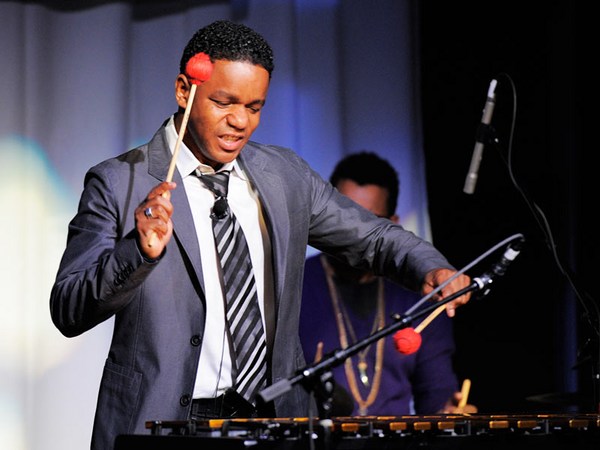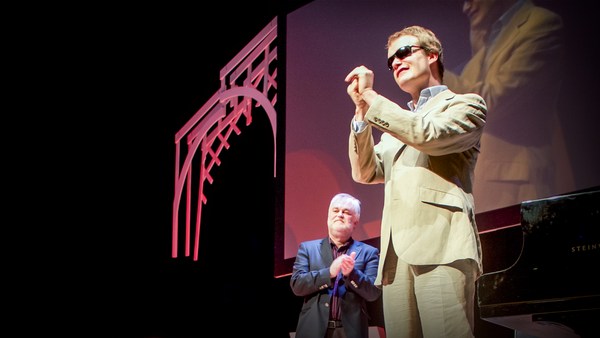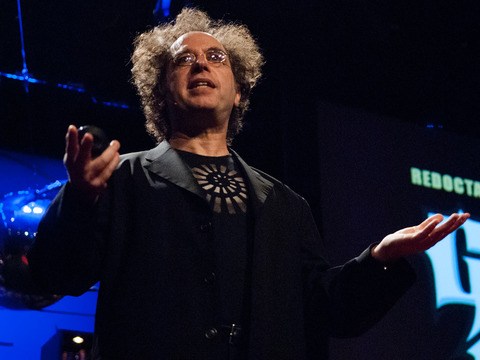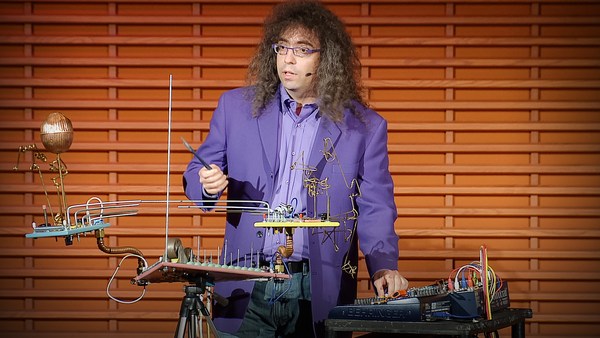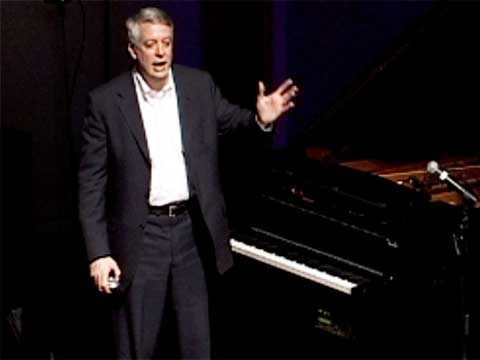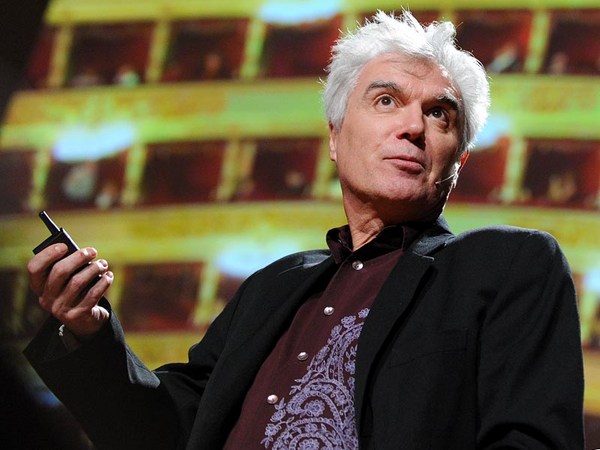Natalie MacMaster: I'm going to just quickly start out with a little bit of music here. (Applause)
(Music)
(Applause)
Thank you! (Applause)
I took my shoes off to dance, but maybe I'll get at that later. Anyways, I... where to start? Well, I'm really excited to talk a bit about my own upbringing in music and family and all of that, but I'm even more excited for you people to hear about Donnell's amazing family and maybe even a little bit about how we met, and all that sort of thing, but for those of you that may not be familiar with my upbringing, I'm from Cape Breton Island, Nova Scotia, eastern Canada, which is a very, very musical island, and its origins come from Scotland with the music and all the traditions, the dancing, the language, which unfortunately is dying out in Cape Breton. The traditional language is Gaelic, but a lot of the music came from the Gaelic language, and the dancing and the singing and everything, and my bloodline is Scottish through and through, but my mother and father are two very, very musical people.
My mom taught me to dance when I was five, and my dad taught me to play fiddle when I was nine. My uncle is a very well-known Cape Breton fiddler. His name's Buddy MacMaster, and just a wonderful guy, and we have a great tradition at home called square dancing, and we had parties, great parties at our house and the neighbors' houses, and you talk about kitchen cèilidhs. Well, cèilidh first of all is Gaelic for party, but kitchen party in Cape Breton is very common, and basically somebody drops into the house, and no matter what house you go to in Cape Breton, there's a fiddle there, guaranteed, and I'd say, well there's first of all more fiddlers per capita in Cape Breton than anywhere in the world, so ten chances to one, the fellow who walked in the door could play it, so you'd have someone come into the house, you'd invite them to play a tune, and lo and behold a little party would start up and somebody would dance, and somebody would sing, and all that sort of thing, so it was a wonderful, wonderful way to grow up, and that is where my beginnings in music come from: my surroundings, my family, just my bloodline in itself, and, oh, I've done lots of things with my music.
I've recorded lots of CDs. I was nominated for a Grammy and I've won some awards and stuff like that, so that's awesome, but the best part was meeting my husband, and I've actually known Donnell for probably 12 years now, and I'm going to get into a little bit of, I guess, how music brought us together, but I'm going to introduce you right now to my new husband as of October 5, Donnell Leahy. (Applause)
(Applause)
Donnell Leahy: Thank you. I'm kind of new to the TED experience and I'm glad to be here, but I'm just trying to put it all together, trying to figure all you people out, and I've been here for a short while, and I'm starting to understand a little bit better. So I asked Natalie, what do I do? And she said, just talk about yourself.
It's kind of boring, but I'll just tell you a little bit about my family. I'm one of 11 brothers and sisters from Lakefield, Ontario, an hour and a half northeast of Toronto, and we grew up on a farm. Mom and Dad raised beef cattle, and I'm the oldest boy. There are four girls a little bit older than me. We grew up without a television. People find that strange, but I think it was a great blessing for us. We had a television for a few years, but of course we wasted so much time and the work wasn't getting done, so out went the television.
We grew up playing— Mom's from Cape Breton, coincidentally. Mom and Natalie's mother knew each other. We grew up playing, and used to dance together, right, yeah. (Laughter) We grew up playing a bunch of, we played by ear and I think that's important for us because we were not really exposed to a lot of different styles of music.
We learned to play the instruments, but we kind of had to come from within or go from within, because we didn't watch television, we didn't listen to a lot of radio. We went to church and to school sometimes, and farmed and played music, so we were able, I think, at a very critical age to develop our own style, our own self, and my mother plays, my father plays, and the style that came from the Ottawa Valley in Ontario, we call it French-Canadian style but it originated in logging camps. Years ago, hundreds of men would go up for the winter to the camps in Northern Ontario and in Quebec, and they were all different cultures, and the Irish, the French, Scottish, German, they'd all meet, and of course at night, they'd play cards and step dance and play fiddles, and over the course of many years, the Ottawa Valley fiddling kind of evolved and the Ottawa Valley step dancing evolved, so that's, I kind of started out with that style and I quickly started doing my own thing, and then I met Natalie, and I was exposed to the great Cape Breton fiddling. That's how we met. (Laughter) You tell them. (Laughter)
NM: You want to or no? (Laughter) Well I guess I have to now. Well, it's just so interesting that Donnell's upbringing was very similar to mine, and I actually saw Donnell play when I was about 12 years old, and he and his family came to Inverness, which is about 45 minutes from where I lived, and I was just blown away, like, it was just amazing, and you'll find out why pretty soon here, but I couldn't believe the fiddling and Mom was there with me, and she was saying — Donnell's mother came up on stage and danced with her children, and Mom was saying, "That's Julie MacDonnell, I used to dance with her when we were kids. Little did I think our children would be playing instruments, you know, playing music, yeah."
Twelve years, er, 20 years later little did she think her kids would be getting married, but anyway, so, then I got a phone call about, I dunno, seven years later. I was 19, first or second year of college, and it was Donnell, and he said "Hi, you probably don't know me but my name is Donnell Leahy." And I said, "I know you. I have a tape of yours at home." And he said, "Well, I'm in Truro," which is where I was, and he asked me out for supper. That's it. (Laughter) (Applause) Then — Will I keep going? (Laughs) (Laughter) Then we dated for two years, broke up for 10, got back together and got married. (Laughter) (Applause)
DL: So anyway, we're running out of time, so I'll just get to it. I'm going to play a piece of music for you. It's actually a Scottish piece I've chosen. I starts out with a slow air. Airs were played in Europe at burials, as a body was carried out from the wake site to the burial site, the procession was led by a piper or a fiddle player. I'll quickly play a short part of the air, and then I'm going to get into kind of a crazy tune that is very difficult to play when you're not warmed up, so, if I mess it up, pretend you like it anyway. It's called The Banks.
(Tuning)
(Laughter)
(Music)
(Applause)
NM: Well, we're gonna play one together now. (Applause) We're laughing, like, because our styles are totally different, as you can hear. And so, you know, Donnell and I are actually in the process of writing new pieces of music together that we can play, but we don't have any of those ready. We just started yesterday. (Laughter) So we're gonna play something together anyway.
DL: With one minute.
NM: With one minute.
(Audience reaction)
DL: You start. NM: No, you have to start, because you've got to do your thing.
(Music)
NM: I'm not tuned. Hold on.
(Tuning)
NM: I feel like I'm in the duck or the bird pose right now. (Laughter)
(Music)
(Audience claps along)
(Applause)
Announcer: Great news, they're running late downstairs. We've got another 10 minutes. (Applause)
NM: Okay. Sure. All right, okay. Let's get her going. (Applause)
(Tuning)
DL: What do you want to play?
NM: Well, um...
(Music) (Laughter)
NM: Uh, sure.
DL: How fast?
NM: Not too fast.
(Music)
(Audience claps along)
(Cheering)
(Audience claps along)
(Music)
(Applause)
DL: We're going to play a tune and Natalie's going to accompany me on the piano. The Cape Breton piano playing is just awesome. It's very rhythmic and, you'll see it. My mom plays piano, and she learned to play before they had a piano at home in Cape Breton. Before Mom's family had a piano in Cape Breton, she learned to play the rhythms on a piece of board, and the fiddlers would all congregate to play on the cold winter's evenings and Mom would be banging on this board, so when they bought a piano, they bought it in Toronto and had it taken by train and brought in on a horse, a horse and sleigh to the house. It became the only piano in the region, and Mom said she could basically play as soon as the piano arrived, she could play it because she had learned all these rhythms. Anyway, we found the piano last year and were able to bring it back home. We purchased it. It had gone through, like, five or six families, and it was just a big thing for us, and we found actually an old picture of somebody and their family years ago. Anyway, I'm blabbering on here.
NM: No, I want you to tell them about Leahy.
DL: What about Leahy? (Laughter)
NM: Just tell them what—
DL: She wants me to talk about— We have a band named Leahy. There's 11 siblings. We, um— What will I tell them? (Laughter) We opened—
NM: No surgeries.
DL: No surgeries, oh yeah. We had a great opportunity. We opened for Shania Twain for two years on her international tour. It was a big thing for us, and now all my sisters are off having babies and the boys are all getting married, so we're staying close to home for, I guess, another couple of weeks. What can I say? I don't know what to say, Natalie. We, uh... (Laughter)
(Laughter)
NM: Is this what marriage is about? (Applause) I like it. (Applause)
(Laughter)
DL: Oh yeah, okay, in my family we had seven girls, four boys, we had two fiddles and one piano, and of course we were all fighting to play on the instruments, so dad and mom set a rule that you couldn't kick anyone off the instrument. You had to wait until they were finished, so of course, what we would do is we'd get on the piano and you wouldn't even get off to eat, because you wouldn't want to give it up to your brother or sister, and they'd wait and wait and wait, and it'd be midnight and you'd be still sitting there on the piano, but it was their way to get us to practice. Will we play a tune?
NM: It worked. DL: It worked. Sorry, I hate to carry on... So this is our last number, and we'll feature Nat on piano. Okay, play in, how about A?
(Music)
(Applause)
